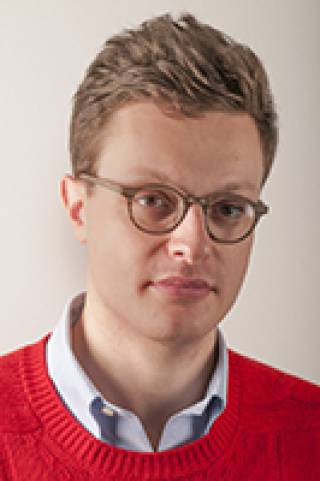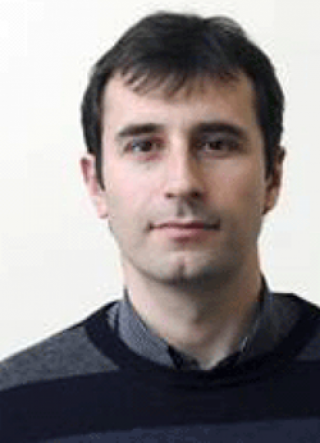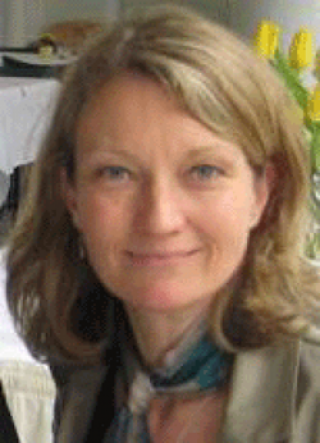2020-2023, Dr Dimitra Gkitsa

Dimitra Gkitsa was the Alexander Nash Fellow during 2020-2023. Her research is situated in the intersection of memory studies, affect, activism, contemporary art and curatorial practices, and the post-socialist visual cultures, with a particular focus on the geo-political region of Southeast Europe.
2018-2020, Dr Luca J. Uberti

Dr. Luca J. Uberti was the Alexander Nash Fellow during 2018-2020. Luca's work examines the relationship between institutional quality and economic development in emerging-market economies, with a particular focus on Albania and Kosovo. While at SSEES, Luca continued to develop an ongoing research programme on the causes and consequences of political corruption. Building on novel survey data collected during his PhD (University of Otago, New Zealand), Luca has examined how bribery and policy rents affect the performance of industrial-sector firms in Albania and Kosovo. This work has recently appeared in Comparative Economic Studies. In co-authored work, he has also studied how politicians manipulate the allocation of mining permits to increase their chance of re-election in Kosovo. This work on "non-conventional" political business cycles has led to a series of publications, the most recent of which has appeared in Post-communist Economies. While at SSEES, Luca also provided policy advice to the Swedish International Development Agency, and authored a policy report on anti-corruption strategy in Albania. Luca is now a Post-doctoral Researcher in the Department of Economics and Management at the University of Luxembourg.
2016-2018, Dr Nevila Pahumi

Dr Nevila Pahumi is a historian of the modern Balkans and my research focuses on the intersections of religion, gender, and nationalism. Her recently defended dissertation raised the connections between the emergence of the Albanian “New Woman” of the 1920s to American Protestant ideas of women’s roles in home and society.
Future projects concern the examination of missionary educational revival, especially with regard to Muslim madrassas and women, as well as the evolution of women’s healthcare in the post-communist period. The first projected contribution concerns women’s education in contemporary Muslim missionary schools. The missionary schools of today bear striking resemblance to the methods and scope of the global nineteenth century American Protestant enterprise, specifically in attracting and training large numbers of professional aspirants. This developing contribution aims to counter standing narratives of Islam and regression, by showcasing a number of female performers who have extended their madrassa vocal training to local and international venues like the Voice of Italy and Eurovision. A second broader project takes into consideration the evolution of women’s health centers from the communist era to the present day, asking specifically why these once community building units of public health outreach and reproductive knowledge and resources have receded after 1990.
Dr Pahumi has two forthcoming publications, "Constructing Difference: American Protestantism, Christian Workers, and Albanian-Greek Relations in Late Ottoman Europe," Journal of Modern Greek Studies vol 36, 2 (2018): 293-329 and "Which Feminism will be Ours: Reframing the Women's Movement in Post Ottoman, Interwar Albania," CLIO Femmes, Genre, et Histoire 48 (2018): 31-44.
2014-2016, Dr Gezim Krasniqi

Dr Gezim Krasniqi is a political sociologist whose research focuses on politics, nationalism, state-building and citizenship in South East Europe. His first co-edited book, Uneven Citizenship: Minorities and Migrants in the Post-Yugoslav Space, focuses on the relations between citizenship and various manifestations of diversity, including, but not exclusively, ethnicity. It addresses migrants and minorities in a novel and original way by adding the concept of ‘uneven citizenship’ to the debate surrounding the former Yugoslavian states. Referring to this ‘uneven citizenship’ concept, this book not only engages with exclusionary legal, political and social practices but also looks at other unanticipated or unaccounted for results of citizenship policies.
More recent projects involve the study of old and new state-nation configurations in South-East Europe. By introducing an analytically useful and original concept of ‘polycentric nation’ in the study of state-nation constellation, the project aims to reconceptualise old notions of ‘national’ politics while considering forms of the national that transcend the boundaries into which it is generally confined. More specifically, this project sets out to analyse the Albanian state-nation constellation in the Balkans in the light of the European Union (EU) integration process.
2007-2010, Dr Rigels Halili

Dr Rigels Halili was the Nash Fellow between 2007 and 2010. Born in Albania, he studied philology and cultural anthropology at the University of Warsaw, where he also earned his PhD. His doctoral thesis (published in Polish in 2012) is an analysis of the role orally transmitted heroic songs and stories have played in the formation of modern national identities, national cultures and political entities of Albanians and Serbs in the Balkans. During his fellowship he carried out research on the Albanian-Greek border region, at the same time initiating a new research project on the making of the borders of the Republic of Kosovo, together with Eric Gordy from SSEES. He has presented his research at international conferences, also publishing a number of papers on these and related themes. While at SSEES he organised several events, most notably with the well-known Albanian writer Fatos Kongoli, and with Enver Hoxhaj, then Minister of Education of the Republic of Kosovo. He has also taught regularly on a number of undergraduate and graduate courses. Currently he is Assistant Professor at the Institute of Slavonic Philology, University Nicolaus Copernicus in Toruń, as well as at the Centre for East European Studies at the University of Warsaw.
2004-2007, Dr Enkeleida Tahiraj

Dr Enkeleida Tahiraj directed the Nash Program during 2004-2007, having been teaching fellow in Albanian Studies at UCL. She had previously obtained an MA in European Studies from the University of Sussex and a PhD in Social Policy from the University of York. While at SSEES she lectured at undergraduate and post-graduate levels on International Politics, Sociology and Social Policy and organised many academic events (international conferences, workshops and book launches). Since leaving SSEES she has been engaged in research on social cohesion and welfare programmes in South-Eastern Europe at the London School of Economics. Enkeleida Tahiraj has also been affiliated with the University of California San Diego, CA and Penn State University, PA. She has convened and presented regularly at international conferences at UCL, LSE, University of York, Oxford and Harvard University. She has consulted extensively for international organisations and companies including the European Commission and World Bank among others, particularly on policy issues related to EU accession, the Acquis and human resources development for education, training, employment and social inclusion. The core of her research is an inter-disciplinary study of poverty, social development, policy-making, language game and institutions. Enkeleida Tahiraj has published widely in scholarly journals on poverty, gender, children, civil society, governance and global social policy.
1997-2003, Dr Stephanie Schwandner-Sievers

Dr Stephanie Schwandner-Sievers served as the first Nash Fellow from 1997 to 2003. She studied social anthropology and Balkan studies at the Free University Berlin, where she developed an interest in Albanian culture and society. She has been conducting research on Albania and Kosovo ever since, publishing on a wide variety of themes. As Nash Fellow she organised many academic events (conferences, workshops and seminars) relating to Albania and the wider region, bringing together academics, policy makers and members of the Albanian community in the UK. For instance, in June 1999, she organised the international conference The Role of Myth in Albanian History and Development, which attracted an international audience and resulted in a widely acclaimed volume. Between 1997 and 1999 she ran a seminar series, Integration and disintegration in Albania, which closely followed the events in Albania at the time. After the end of her tenure at SSEES, Stephanie Schwandner-Sievers set up the consultancy firm Anthropology Applied Limited. As director she has since advised, conducted training and produced reports for international and national agencies including the World Bank, the EU, the International Criminal Tribunal for the Former Yugoslavia (ICTY), the Democratic Centre for the Control of the Armed Forces (DCAF), the Foreign and Commonwealth Office (FCO), and the International Organisation for Migration (IOM). She has also assisted in numerous immigration and criminal court cases, as well as advised the UK social services and police. Currently she is a research fellow at the University of Roehampton and teaches at the University of Bologna.
 Close
Close

